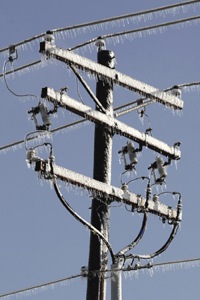
| Behind The Sound Bite: Burying Power Lines
11/21/11
After a snowstorm late last month knocked out power to nearly 700,000 Massachusetts residents, Gov. Deval Patrick and Richard K. Sullivan Jr., the secretary of Office of Energy and Environmental Affairs, said burying the state’s power lines could help prevent future outages, according to media reports, but the massive undertaking would cost a jaw-dropping $1 trillion.

Where are officials getting that figure from?
The figure came from Thomas May, the CEO of NStar, during a post-storm meeting, according to a spokeswoman for Sullivan.
Caroline Allen, an NStar spokeswoman, said the figure was “not a formal estimate.” She said the figure was meant to “demonstrate the complexity involved in building an underground system.”
“There are so many variables ... a more accurate estimate can’t be discussed without a complete engineering review of the entire state,” she said. “Tom was pointing out that it would be astronomically expensive.”
Who has studied the costs of undergrounding?
Undergrounding all power lines would be an expensive, multidecade effort. The cost per customer would almost surely make the project uneconomical. And underground power lines are not immune to outages.
The Edison Electric Institute (where May is a board member), which represents shareholder-owned electric companies across the country, concluded in a 2009 study that conversion costs for distribution lines could range from $80,000 per mile in rural areas to $2.1 million in urban areas. For transmission lines it would be even more.
How many miles of power line are there in Massachusetts?
The state has about 29,080 miles of distribution lines and approximately 1,700 miles of overhead transmission lines. Using the high end of the EEI price estimates, it would cost Massachusetts about $99.1 billion to bury all power lines, more than 10 times less than a trillion dollars.
Comments
patrickmehr (November 20, 2011 10:30AM EST)
Listen to a WBUR report on the Concord municipal utility: in Concord MA, half the lines are already underground at a cost to ratepayers of $1.50 per month extra -- added to rates that are 30%-40% lower, repeat lower, than NStar's, so moving wires underground is effectively free in Concord.
This "information" from NStar is incorrect, perhaps to serve its self-interest: NStar wants to preserve its monopoly, to prevent a community that wants its wires underground to even consider replacing NStar with a municipal utility that would do it.
In Europe, many wires are already underground: in Belgium and Holland, almost 100%; in Germany, 75%; in France, 33%.
Patrick Mehr
Massachusetts Alliance for Municipal Electric Choice
============
WBJ Talk Back
12/05/11
BURYING POWER LINES
Our “Behind The Sound Bite” item in the Nov. 21 edition addressed the issue of how much it would cost to bury power lines underground, a topic that came up after the surprise snowstorm in late October. NStar said it would cost $1 trillion, according to a state official. That drew this reaction from an official with an organization that advocates the formation of more municipal utilities in the commonwealth:
"This ‘information’ from NStar is incorrect, perhaps to serve its self-interest: NStar wants to preserve its monopoly, to prevent a community that wants its wires underground to even consider replacing NStar with a municipal utility that would do it."
Online Reader Patrick Mehr, Mass. Alliance for Municipal Electric Choice




